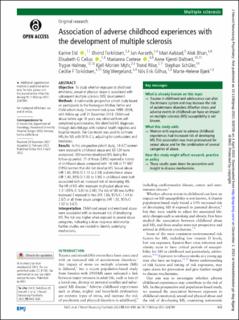Association of adverse childhood experiences with the development of multiple sclerosis
Eid, Karine; Torkildsen, Øivind; Aarseth, Jan Harald; Aalstad, Mari; Bhan, Alok; Celius, Elisabeth Gulowsen; Cortese, Marianna; Daltveit, Anne Kjersti Nesje; Holmøy, Trygve; Myhr, Kjell-Morten; Riise, Trond; Schuler, Stephan; Torkildsen, Cecilie Fredvik; Wergeland, Stig; Gilhus, Nils Erik; Bjørk, Marte-Helene
Peer reviewed, Journal article
Published version

Permanent lenke
https://hdl.handle.net/11250/3037596Utgivelsesdato
2022Metadata
Vis full innførselSamlinger
- Artikler [5068]
- Publikasjoner fra CRIStin FHI [7544]
Originalversjon
Journal of Neurology, Neurosurgery and Psychiatry. 2022, 93 (6), 645-650. 10.1136/jnnp-2021-328700Sammendrag
Objective: To study whether exposure to childhood emotional, sexual or physical abuse is associated with subsequent multiple sclerosis (MS) development. Methods: A nationwide, prospective cohort study based on participants in the Norwegian Mother, Father and Child cohort study. Enrolment took place 1999-2008, with follow-up until 31 December 2018. Childhood abuse before age 18 years was obtained from self-completed questionnaires. We identified MS diagnoses through data-linkage with national health registries and hospital records. The Cox model was used to estimate HRs for MS with 95% CIs, adjusting for confounders and mediators. Results: In this prospective cohort study, 14 477 women were exposed to childhood abuse and 63 520 were unexposed. 300 women developed MS during the follow-up period. 71 of these (24%) reported a history of childhood abuse, compared with 14 406 of 77 697 (19%) women that did not develop MS. Sexual abuse (HR 1.65, 95% CI 1.13 to 2.39) and emotional abuse (HR 1.40, 95% CI 1.03 to 1.90) in childhood were both associated with an increased risk of developing MS. The HR of MS after exposure to physical abuse was 1.31 (95% CI 0.83 to 2.06). The risk of MS was further increased if exposed to two (HR 1.66, 95% CI 1.04 to 2.67) or all three abuse categories (HR 1.93, 95% CI 1.02 to 3.67). Interpretation: Childhood sexual and emotional abuse were associated with an increased risk of developing MS. The risk was higher when exposed to several abuse categories, indicating a dose-response relationship. Further studies are needed to identify underlying mechanisms. Keywords: multiple sclerosis; trauma, psychol seque. © Author(s) (or their employer(s)) 2022. Re-use permitted under CC BY-NC. No commercial re-use. See rights and permissions. Published by BMJ.